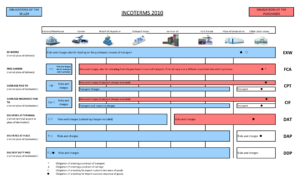
For anyone working within or dealing with the shipping industry, gaining a thorough understanding of International Commercial Terms, known in short as Incoterms, is absolutely vital. These Incoterms, published by the International Chamber of Commerce (ICC), relate to international commercial law and are widely relied upon to ensure that all tasks, costs, and risks associated with the international transport and delivery of goods are clearly communicated to all parties involved. While Incoterms do not in themselves form a legally binding contract, their use is heavily encouraged by trade councils and regulatory bodies and they are often incorporated into sales contracts on a global scale.
First published by the ICC in 1936, the Incoterms are now in their eighth iteration following amendments which took place in 1953, 1967, 1976, 1980, 1990, 2000, and finally 2010. In their present day form these incoterms encompass eleven variations – down from thirteen in the previous version – which outline the obligations of both the buyer and seller depending upon the agreed terms. Seven of the eleven rules apply universally to all modes of transport, while four relate specifically to sea and inland waterway transport.
Progress toward a newly updated set of terms, to be known as Incoterms 2020, is currently underway with the new rules set to be unveiled in late 2019 before coming into effect as of 2020. The specifics of the updated terms are yet to be revealed, though the drafting group have reportedly started fielding suggestions to applicable parties seeking comments and opinions on the proposed new rules.
As you can see in the graphic below, each variation carries its own set of obligations on the part of both parties. Knowing exactly what you are agreeing to is paramount when entering into any contract, so we encourage you to bookmark this page for later reference.
All of these abbreviations and variations can soon become confusing; fortunately the ICC have provided a breakdown of all eleven rules from the Incoterms 2010 edition to help you master the terminology and processes. A short description of the seven universal rules reads as follows:
RULES FOR ANY MODE OR MODES OF TRANSPORT
⦁ EXW (Ex Works)
“Ex Works” means that the seller delivers when it places the goods at the disposal of the buyer at the seller’s premises or at another named place (i.e. works, factory, warehouse, etc.). The seller does not need to load the goods on any collecting vehicle, nor does it need to clear the goods for export, where such clearance is applicable.
⦁ FCA (Free Carrier)
“Free Carrier” means that the seller delivers the goods to the carrier or another person nominated by the buyer at the seller’s premises or another named place. The parties are well advised to specify as clearly as possible the point within the named place of delivery, as the risk passes to the buyer at that point.
⦁ CPT (Carriage Paid To)
“Carriage Paid To” means that the seller delivers the goods to the carrier or another person nominated by the seller at an agreed place (if any such place is agreed between parties) and that the seller must contract for and pay the costs of carriage necessary to bring the goods to the named place of destination.
⦁ CIP (Carriage and Insurance Paid To)
“Carriage and Insurance Paid to” means that the seller delivers the goods to the carrier or another person nominated by the seller at an agreed place (if any such place is agreed between parties) and that the seller must contract for and pay the costs of carriage necessary to bring the goods to the named place of destination.
The seller also contracts for insurance cover against the buyer’s risk of loss of or damage to the goods during the carriage. The buyer should note that under CIP the seller is required to obtain insurance only on minimum cover. Should the buyer wish to have more insurance protection, it will need either to agree as much expressly with the seller or to make its own extra insurance arrangements.
⦁ DAT (Delivered At Terminal)
“Delivered at Terminal” means that the seller delivers when the goods, once unloaded from the arriving means of transport, are placed at the disposal of the buyer at a named terminal at the named port or place of destination. “Terminal” includes a place, whether covered or not, such as a quay, warehouse, container yard or road, rail or air cargo terminal. The seller bears all risks involved in bringing the goods to and unloading them at the terminal at the named port or place of destination.
⦁ DAP (Delivered At Place)
“Delivered at Place” means that the seller delivers when the goods are placed at the disposal of the buyer on the arriving means of transport ready for unloading at the named place of destination. The seller bears all risks involved in bringing the goods to the named place.
⦁ DDP Delivered Duty Paid
“Delivered Duty Paid” means that the seller delivers the goods when the goods are placed at the disposal of the buyer, cleared for import on the arriving means of transport ready for unloading at the named place of destination. The seller bears all the costs and risks involved in bringing the goods to the place of destination and has an obligation to clear the goods not only for export but also for import, to pay any duty for both export and import and to carry out all customs formalities.
Source: ICC website. The full text of the 2010 edition of the Incoterms rules is available at http://store.iccwbo.org/.
“Incoterms” is a trademark of the International Chamber of Commerce (ICC).






